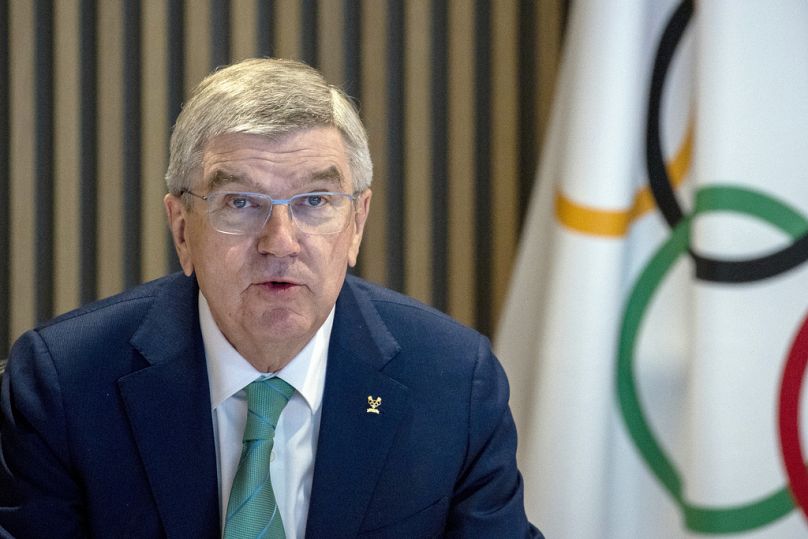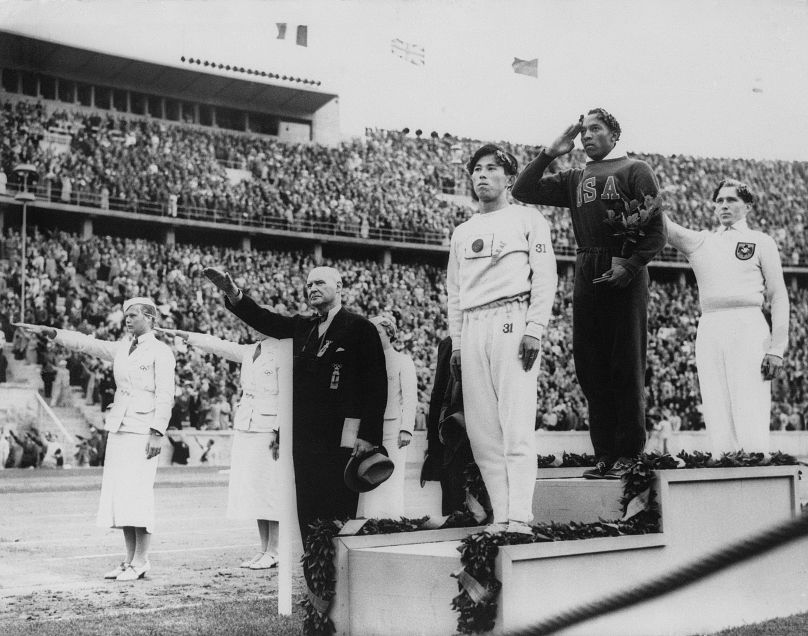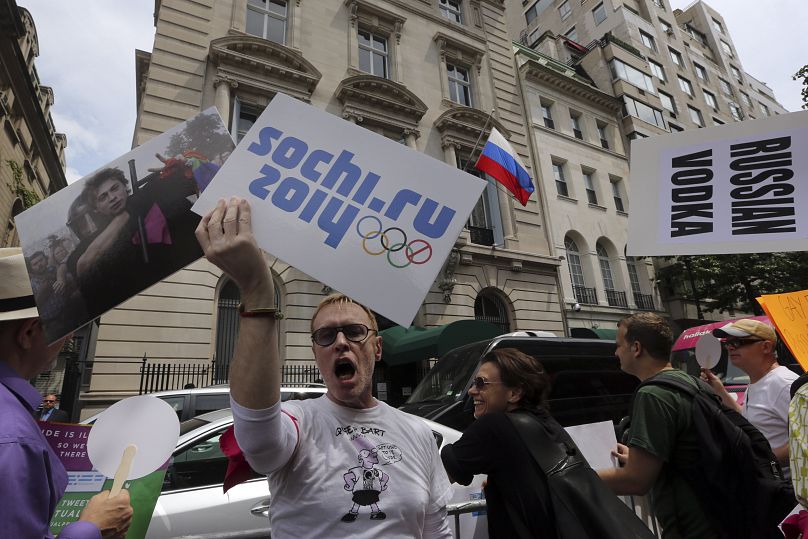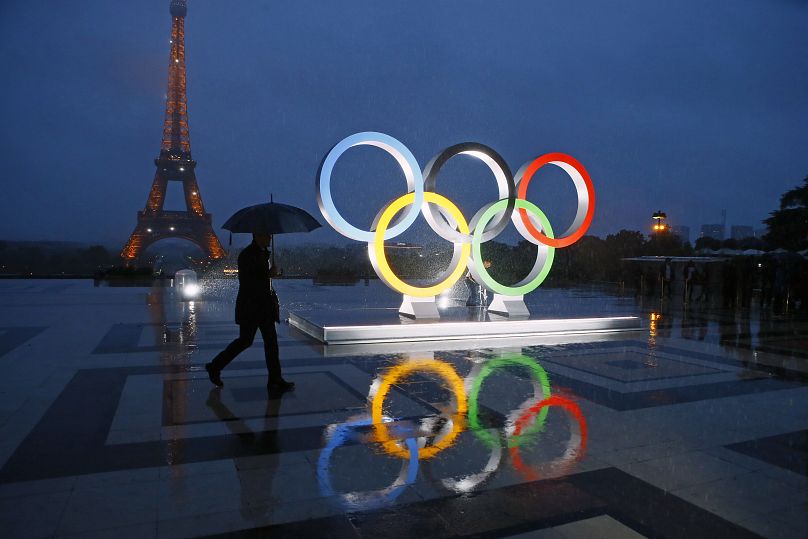Ukraine has threatened to boycott the 2024 Olympic Games if the IOC decides to let Russian and Belarusian athletes compete.
The International Olympic Committee is facing growing pressure to make up its mind and decide whether it will let Russian and Belarussian athletes take part in the 2024 Paris Olympic Games.
 ADVERTISEMENT
ADVERTISEMENT
 ADVERTISEMENT
ADVERTISEMENT
With less than 500 days to go until the opening ceremony along the River Seine in the French capital, a total of 35 countries - including the US, Germany, the UK and Australia - have demanded that the committee ban Russian and Belarussian athletes.
So far, the IOC has appeared unwilling to budge, with German President Thomas Bach slamming the calls to ban Russian athletes as "deplorable".
In fact, the IOC has even opened up a pathway to competition outside the Olympics for Russian and Belarussian athletes to compete under a neutral flag - with some sports federations like table tennis eagerly agreeing to let previously banned athletes from Russia and Belarus return to competition.
This week, Bach hit out at what he called the "double standards" of European countries. At a news conference he said: "We have not seen a single comment about their attitudes toward the participation of athletes whose countries are involved in the other 70 wars and armed conflicts in the world".
It's precisely that stance that has led Ukraine to also call for a ban, and raise again the threat of a boycott in Paris next year: with Wladimir Klitscho, an Olympic gold medal boxer at the 1996 Atlanta Games (and the brother of Kyiv Mayor Vitali), hitting out at the IOC, saying "Thomas Bach serves the colours and interests of Russia."
What sanctions are Russian athletes currently facing?
Following sanctions imposed on Russia and Belarus after the invasion of Ukraine began on 24 February 2022, the two countries have been banned from most major sports competitions.
World Athletics, the governing body for the sport of athletics, banned Russian and Belarusian athletes from all its events for the foreseeable future in March last year and has recently reconfirmed its decision.
Earlier this month, the European Athletics Council said that Russian and Belarusian athletes should remain banned from its events until the war in Ukraine is ended. FIFA and UEFA currently don’t allow Russian national teams and football clubs to compete in their events.
When it comes to the Olympic Games, Russia and Belarus are forbidden from hosting any Olympic events, their government officials aren’t invited to attend competitions, and their flags cannot be displayed at any sports event or meeting. But the IOC is yet to take a decision on whether Russian and Belarusian athletes should participate on the condition that they compete as individuals under a neutral flag.
The Russian flag hasn’t actually been seen at an Olympic event – or any other major international sports event – for the past four years, due to a doping ban imposed on the country’s athletes after widespread violations of anti-doping regulations were found among competitors from Russia. Since 2019, Russian athletes have been competing under a neutral flag.
Who has boycotted the Olympics before, and why?
Countries boycotting the Olympics for one reason or another in recent history is more common than you might imagine.
“Most people remember the reciprocal boycotts of 1980, with the West boycotting the Moscow Olympics, and then the Communist bloc boycotting the Los Angeles Olympics four years later. But those were not the first Olympic boycotts”, Heather Dichter, Associate Professor of Sport History & Sport Management at De Montfort University in Leicester, UK, told Euronews.
The very first boycott of an Olympics came in 1956, when there were at least three parallel boycotts of the Melbourne Olympics unfolding across the world: Egypt, Iraq, Lebanon, and Cambodia ditched the Games over the Suez Crisis, in what Dichter said was “not entirely a boycott, but a little bit more like not participating” as anyway it’s harder for a country facing a political crisis to take part in the competitions.
The Netherlands, Spain, and Switzerland didn’t participate to condemn the Soviet invasion of Hungary, “which happened while the Soviet and Hungarian athletes were on a boat to Australia,” Dichter said.
China boycotted the Games for another reason entirely: a dispute with Taiwan over who should have the right to represent the real China.
In 1964, North Korea, Indonesia, and China boycotted the Tokyo Olympics after the IOC refused to accept athletes that had participated in the Games of the New Emerging Forces in Jakarta the year before.
In 1976, the Montreal Olympics were boycotted by 29 African countries protesting against the IOC’s refusal to ban New Zealand after their rugby team toured South Africa, defying the UN’s calls for a sporting embargo. Burma, Sri Lanka, Iraq, Taiwan, and Guyana also boycotted the Games.
In 1980, in what’s possibly one of the biggest boycotts in the history of the Games, 66 countries led by the US boycotted the Summer Olympic Games in Moscow entirely to protest over the Soviet-Afghan war. The war, launched in 1979, ended up lasting ten years, during which thousands of Afghans were killed.
Four years later, the 1984 Los Angeles Olympics were also subject to a boycott by 18 Soviet countries in response to the 1980 Moscow Olympics boycott. In 1988, North Korea and Cuba boycotted the Seoul Olympics, while Ethiopia, Albania, and Seychelles didn’t respond to the IOC’s invitation,
Last year, the Winter Olympics in Beijing were boycotted by 10 countries, including the US, the UK, Canada, and Belgium, over accusations of human rights abuses committed by the Chinese government against the Uyghurs. However, it wasn’t quite a full-fledged boycott: these countries didn’t send their delegations to the Games, but their athletes were allowed to compete.
Do boycotts work?
It’s up for debate whether boycotting the Olympics to punish a dangerous rogue state or protest against a bully country actually works.
In the 1930s, Western countries debated whether to boycott the 1936 Summer Olympics in Berlin, only to eventually decide against it. The Olympics famously went on as the Nazis were consolidating their power in Germany, and “the Nazis definitely thought it was an absolute triumph,” Dichter said.
But would a boycott of the 1936 Berlin Olympics have stopped the Nazis from rising to power, or would have affected their decisions in any way? Dichter said that Olympic boycotts rarely have an impact on politics.
“The Soviet Union didn’t leave Afghanistan, even though the United States and almost 60 other countries didn’t participate. The one time we did really see a bit of a political change as a result was actually the 1976 African boycott in Montreal,” Dichter continued.
“And it was because Canada was hosting the Commonwealth Games two years later in Edmonton and Canada was very scared that if the African countries in the Commonwealth didn’t participate in the Commonwealth Games – and also perhaps some of the Black Caribbean Commonwealth members – then the 78 Commonwealth Games would be a very white affair and they didn’t like the optics of that.”
After that, Canada signed an agreement that included a provision about not participating in sports against apartheid South Africa.
“The biggest impact when an Olympic boycott happens is on the athletes themselves”, Dichter said. “Athletes rarely participate in more than one Olympics. Michael Phelps and Usain Bolt are the exceptions, the majority of athletes only ever compete in one Olympic Games.
“And so if there is a boycott, the most affected group is actually the athletes who trained for four years or really most of their lives and then don’t have that opportunity to participate. And it is rare that an Olympic boycott actually has an impact in changing politics.”
But Ukrainian top officials are making the point that Russian athletes are closely tied to the Russian state and the Russian army.
“Sports, state propaganda, and the army are indivisible in Russia. And now Putin has already introduced not only politics but also war crimes into sports. There is no way for Russian or Belarusian athletes to compete in the Paris Olympics or any other major sporting event,” said Ukraine’s Minister of Foreign Affairs Dmytro Kuleba.
“Back at the Tokyo @olympics in 2021, #Russia won 71 medals. Of them, #Russian soldier athletes received 45. They belong to the same army that is now committing war crimes in #Ukraine. @iocmedia, make your decision to finally #BoycottRussianSport!,” wrote the Ukrainian Minister of Foreign Affairs on Twitter.
Will there be a boycott of the 2024 Paris Olympics?
To date, some 40 countries have condemned the IOC’s decision to allow Russian and Belarusian athletes to compete in 2024 under a neutral flag, accusing the committee of attempting to normalise relationships with a country involved in the aggressive invasion of another sovereign state. The list of countries which have criticised the committee’s decision includes France, the hosting country of the Olympic Games next year.
Bach has defended the IOC’s decision, saying that Russian and Belarusian athletes are already allowed to participate in competitions “almost every day in a number of sports.”
Several countries besides Ukraine, including Lithuania, Latvia, Poland, and Denmark, have already said that they will boycott the 2024 Summer Games if the IOC doesn’t recall its decision. Polish Sports Minister Kamil Bortniczuk said that up to 40 could join the boycott.
Dichter said that the decision to boycott the 2024 Games – which could cost the IOC millions – will also come down to individual athletes.
“How many other athletes don’t feel comfortable competing against Russians?,” she argued. “We are in an era now where athletes’ voices matter more than they ever did in the past. And I think it is important to listen to them.”
Another thing to keep in mind, Dichter said, is that countries hosting the Olympics or any sporting event still apply their own national laws with respect to who is allowed to enter the country.
“France could choose to make the decision that nobody with a Russian passport is allowed to enter the country. And if they were to do that, that would take that decision out of the IOC’s hands, whether or not the French government would choose to do so.”
Euronews contacted the IOC for comment but didn’t receive an immediate response.
Graphics by Sudesh Baniya.














